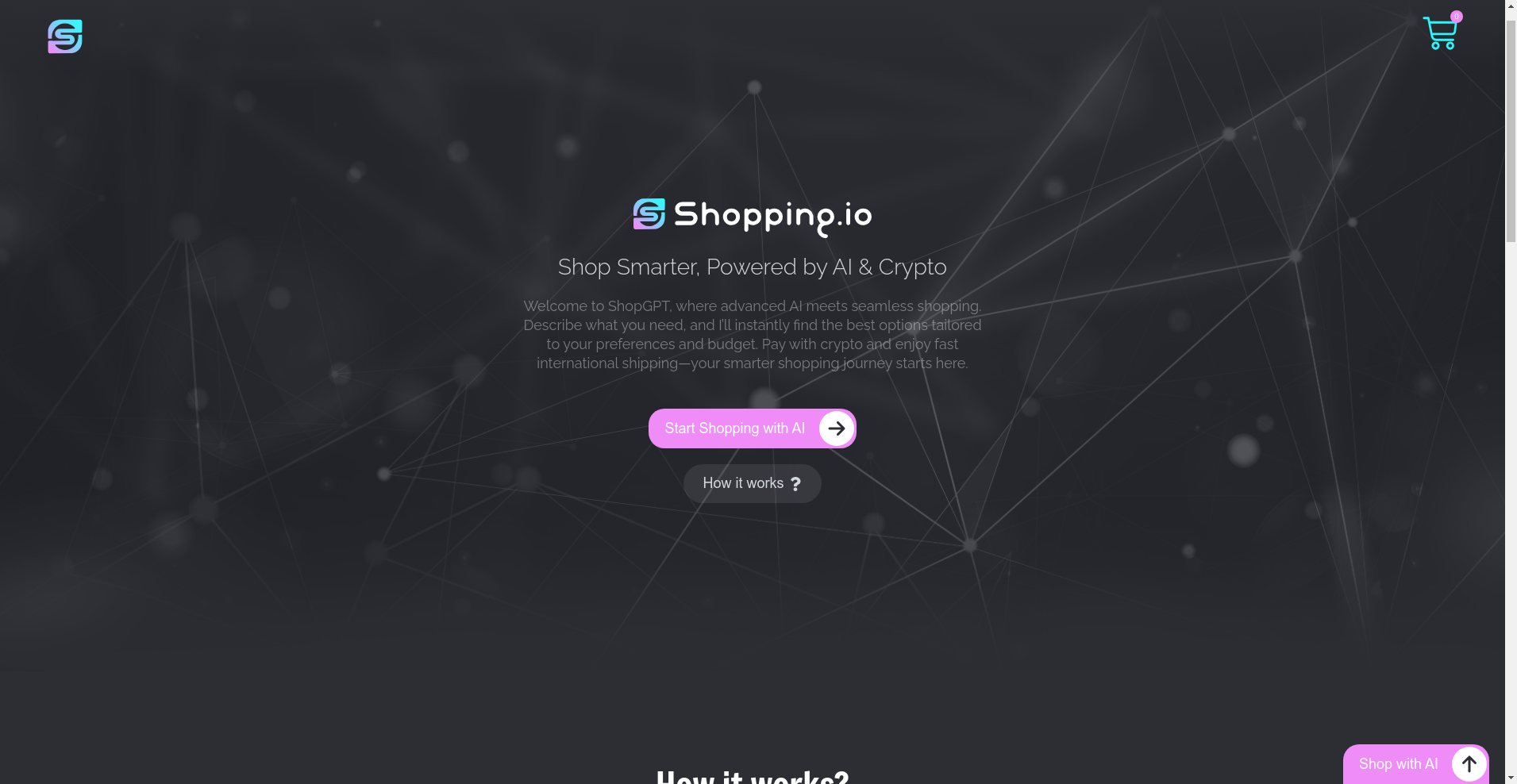Shopping.io Review: Scam or Legit Crypto? Uncovering All The Red Flags

What Exactly Is Shopping.io?
Shopping.io presents itself as an innovative e-commerce platform that combines Artificial Intelligence (AI) and cryptocurrency payments to revolutionize online shopping. Promising a seamless experience, the platform claims users can discover products, pay securely with various cryptocurrencies, and enjoy international shipping—with benefits like discounts and free shipping when using its native $SHOP token.
However, as interested investors and consumers, it's essential to approach such claims skeptically. This article is an independent investigation aimed at verifying these promises, scrutinizing the project's legitimacy, and highlighting potential risks involved in engaging with Shopping.io.
Who Is The Team Behind Shopping.io?
One of the primary red flags when evaluating any crypto project is the transparency and credibility of its team. In the case of Shopping.io, there is little publicly available information about the founders or core development team. Their online presence is minimal, and most references point only to marketing materials or vague community channels.
- Anonymous or Doxxed?: The team appears largely anonymous, with no verifiable identities or professional backgrounds disclosed publicly.
- Roadmap & Vision Analysis:
- Features like AI shopping assistants and broad international shipping are ambitious but lack concrete developmental milestones or regular updates.
- The platform emphasizes integration with multiple retail partners but offers no verified partnerships or official collaborations.
- Projected timelines are vague, and the project’s future plans seem overly optimistic without clear deliverables or proof of progress.
This lack of transparency diminishes the project's credibility and suggests it could be highly speculative or even potentially a scam.
Shopping.io Security Audit: A Deep Dive into the Code
The only available formal security audit comes from Chainsulting, assessing Shopping.io's smart contracts. The audit report (available [here](https://github.com\/chainsulting\/Smart-Contract-Security-Audits\/blob\/master\/Shopping.io\/02_Smart%20Contract%20Audit%20Shopping_SPI_Staking.pdf)) indicates that the project has undergone some review, but the findings raise concerns:
- Audit Score & Incidents: The reported score is a modest 5.25 out of 10, with some incidents flagged, though details are limited.
- Vulnerabilities & Risks: The audit uncovers potential vulnerabilities in the smart contract code, including possible reentrancy issues and access control weaknesses.
- Centralization Concerns: The audit suggests certain functions may be controlled by a small group of developers, increasing the risk of malicious activity or unilateral changes.
While some third-party review exists, the moderate security rating coupled with incident reports indicates a significant risk for investors relying on smart contract integrity. The lack of ongoing, transparent security updates further heightens concerns about potential vulnerabilities.
Shopping.io Tokenomics: A Fair System or a Trap?
Information about the native $SHOP token is scarce and lacks transparency. Based on available summaries, the token is purportedly used to access benefits like free international shipping and discounts, but detailed tokenomics are missing or unclear.
- Total Supply & Distribution: No official whitepaper or detailed token distribution info is available; this opacity raises red flags about potential for massive token dumps or inflationary pressures.
- Utility & Incentives: The primary utility appears to be payment-related benefits, but beyond that, the token's role in governance, staking, or income generation remains uncertain.
- Market Data & Volatility Risks: Without transparent data on circulating supply or market capitalization, investors cannot assess token stability or inflation risks.
In light of the opaque tokenomics, there's a very real risk of sudden dumps or pump-and-dump schemes, which are common in projects with undisclosed distributions and high reliance on vague utility claims.
Is Shopping.io a Ghost Town? Checking for Real Activity
Despite the slick marketing, evidence of real ongoing development or community activity is limited. Their social platforms, such as Telegram, Reddit, and Medium, show sporadic updates and minimal engagement from the core team. The project's ranking (392) on certain lists and a low combined social presence suggest that the project might be stagnating or heavily overhyped.
Furthermore, the lack of recent milestone announcements, no verifiable partnerships, and minimal visible code updates point towards a dormant ecosystem rather than a thriving one. The platform heavily markets its features, yet tangible progress remains unverified, raising suspicion about its actual development stage.
The Fine Print: What Shopping.io's Legal Documents Are Hiding
Shopping.io's terms and policies reveal several questionable aspects:
- Vague Disclaimers: The company disclaims any affiliation with listed brands, yet markets itself as an integrated shopping solution, seeming to blur the lines of endorsement.
- Limited Refunds & Returns: With a 30-day return window and the requirement to contact Shopping.io directly, users face a risk of unresolved disputes or lack of consumer protections.
- Prohibited Items: Orders with gift cards, weapons, or GPUs are categorically not fulfilled, indicating platform censorship or restrictions that could hide operational limitations.
These legal clauses, especially the vague disclaimers and limited refund policies, suggest a lack of accountability and transparency, which are red flags for potential scam operation or at least poor consumer protection standards.
Final Verdict: Should You Risk Investing in Shopping.io?
Based on a comprehensive review of available data, Shopping.io presents itself as a platform with ambitious claims but minimal verifiable evidence of credible development, transparent governance, or security. Its anonymous team, limited community engagement, questionable tokenomics, and only a moderate security audit raise significant concerns.
Positive Points:
- Claims of integrating AI and crypto payments in e-commerce
- Global shipping to numerous countries
- Presence of a security audit, albeit with warning signs
- Active social media channels and customer support options
- Lack of transparent team and roadmap
- Opaque tokenomics with no clear utility or distribution details
- Moderate security score and flagged vulnerabilities
- Limited real community engagement and obvious stagnation
- Vague legal disclaimers and restrictive refund policies
Investors must exercise extreme caution. Without verifiable development progress, transparent governance, and stronger security assurances, engaging with Shopping.io risks being akin to participating in a potential scam or a highly speculative project. Conduct thorough due diligence and consider these red flags before any involvement. Remember: Never invest more than you can afford to lose in projects with these warning signs.

Michael Brown
Head of Protocol Security & Audits
Systems engineer applying mission-critical principles to DeFi. I stress-test smart contracts and economic models to find the breaking points before they find your wallet.
Similar Projects
-
Kaiko Studios
Review of Kaiko Studios: Crypto Project Scam Checker & DeFi Analysis
-
AI Casino Online
Review of AI Casino Online - Crypto Scam Checker & Project Scam Review
-
Assisterr
Comprehensive Review of Assisterr: Crypto Scam Checker and Project Analysis
-
eTRNX (Eternex Network)
Review of eTRNX Project: Crypto Scam Checker & Project Scam Review
-
Blaze
Comprehensive Review of Blaze Crypto Project Scam Checker - Is This Project Legit or a Rug Pull?